

Color, 1981, 124m.
Directed by Michael Mann
Starring James Caan, Tuesday Weld, Robert Prosky, Willie Nelson, James Belushi, Tom Signorelli, Dennis Farina
Criterion (Blu-Ray & DVD) (US RA/R1 HD/NTSC), MGM (DVD) (US R1 NTSC)/ WS (1.85:1) (16:9)
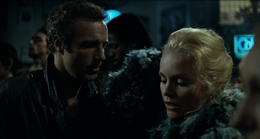
One of the most consistently exceptional American directors working today, Michael Mann
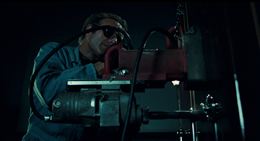 was something of an unknown quantity when he shot Thief in 1980. At the time its aesthetic was like a cold splash of water in the faces of viewers and critics accustomed to both the gritty realism and the glossy blockbuster showmanship born from the New Hollywood of the 1970s, but here was a film bathed in darkness, neon, and glittering surfaces, with a pulsating electronic score often communicating what its characters can never verbalize themselves. There were definitely precedents to this heist opus in European cinema, particularly with Rififi and the films of Jean-Pierre Melville, but Mann's film gave the template a dynamic creative spin that would influence the neo-noir wave of the '80s and many films far beyond, most obviously Drive (which is essentially a love letter to both this film and The Driver.)
was something of an unknown quantity when he shot Thief in 1980. At the time its aesthetic was like a cold splash of water in the faces of viewers and critics accustomed to both the gritty realism and the glossy blockbuster showmanship born from the New Hollywood of the 1970s, but here was a film bathed in darkness, neon, and glittering surfaces, with a pulsating electronic score often communicating what its characters can never verbalize themselves. There were definitely precedents to this heist opus in European cinema, particularly with Rififi and the films of Jean-Pierre Melville, but Mann's film gave the template a dynamic creative spin that would influence the neo-noir wave of the '80s and many films far beyond, most obviously Drive (which is essentially a love letter to both this film and The Driver.) The thief of the film's title is Frank (Caan), a seasoned Chicago jewel thief with hard time in his past who's planning to set up a life with the woman he's dating, Jessie (Weld). A specialist in cracking safes and handling the delivery of diamonds, Frank reluctantly agrees to pull off one big job for crime boss Leo (Prosky), who indicates he'd rather keep Frank on indefinitely as a well-paid member of his team. Frank and his associate, Barry (Belushi), start to plan the job and figure out how to pull it off, but that turns out to be the least of their problems...
Mann's debut feature film, Thief was heavily influenced by the director's experiences at Folsom State Prison working on his solid made-for-TV film The Jericho Mile as well as a stint as one of the writers on Straight Time. At the time he had optioned a book by real-life thief Frank Hohimer (a pseudonym) entitled The Home Invaders, which remains a credited source on the film even though it was discarded entirely by the completion of the screenplay. Apart from the excellent Caan and Weld, the film boasts a fascinating cast including debut performances from Prosky (who went on to
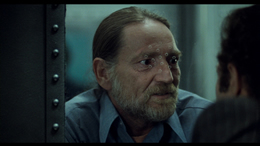 films like Christine) and Dennis Farina, who would star in Mann TV series Crime Story and Luck. There's even a juicy role for Tom Signorelli, best known to horror fans for Alice, Sweet Alice. Perhaps the most distinctive element of the film is its atmospheric, often striking score by German electronic group
films like Christine) and Dennis Farina, who would star in Mann TV series Crime Story and Luck. There's even a juicy role for Tom Signorelli, best known to horror fans for Alice, Sweet Alice. Perhaps the most distinctive element of the film is its atmospheric, often striking score by German electronic group 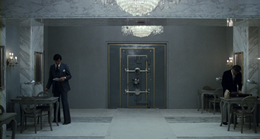 Tangerine Dream, who had released several albums (with different member configurations) but had only scored one previous film, William Friedkin's Sorcerer. The impact of their work here would be hard to overstate as the sound would go on to become imitated for decades, while the group would go on to score many films throughout the decade including Near Dark and Risky Business. (Astoundingly, the score was nominated for a Razzie Award, which just goes to show how off base the organization's taste can be at times. Of course, they'd slapped two nominations on The Shining the year before, too.)
Tangerine Dream, who had released several albums (with different member configurations) but had only scored one previous film, William Friedkin's Sorcerer. The impact of their work here would be hard to overstate as the sound would go on to become imitated for decades, while the group would go on to score many films throughout the decade including Near Dark and Risky Business. (Astoundingly, the score was nominated for a Razzie Award, which just goes to show how off base the organization's taste can be at times. Of course, they'd slapped two nominations on The Shining the year before, too.) Released theatrically with a running time of 122 minutes, Thief was released in the same version on VHS but was tweaked slightly by Mann when it carried over to laserdisc from MGM in the late '90s. An additional two-minute scene was added after the heist sequence that opens the film with Caan and Willie Dixon sharing a breakfast at dawn on the river bank, while a lengthy shot of Tuesday Weld and the adopted baby walking along the beach in San Diego was excised entirely (causing a disruption in one of the score's best cues). A few other minor editorial changes involving color timing and film speed were also imposed, though none of these were as extreme as the changes Mann imposed on the video releases of some of his other films like Miami Vice and The Last of the Mohicans. That same transfer was reused for the MGM DVD release, non-anamorphic and looking very dated by turn of the '00s, but it retained the excellent Mann/Caan commentary track recorded for the laserdisc in which they talk at length about pretty much every step of preparation in making the film.
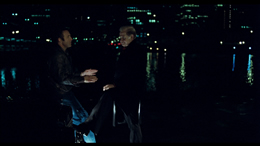 When Criterion announced the release of Thief as a Blu-ray/DVD combo edition in early 2014, it was a major relief for fans tired of lackluster DVD transfer. The film had aired in HD in both the revised cut and the theatrical one a handful of times, so the natural assumption would be that this would be the same source for the Blu-ray, too. Well, surprise! Though billed as a director's cut, this isn't the same version. The extra scene is still there, but thankfully the beach sequence is back to its original length with the music intact, thus creating the longest version we've had to date (about 30 seconds longer than the DVD) and something much closer to the theatrical version overall, including the restoration of slow motion during the last gunfight instead of the goofy sped up effect applied to the laserdisc and DVD. The DTS-HD 5.1 track sounds excellent (optional English subs are also included), with the score benefiting in particular from the spacious presentation, while the transfer looks terrific with even the darkest scenes popping through far more clearly than before. It's safe to say you can toss your DVD in the trash bin after grabbing this one.
When Criterion announced the release of Thief as a Blu-ray/DVD combo edition in early 2014, it was a major relief for fans tired of lackluster DVD transfer. The film had aired in HD in both the revised cut and the theatrical one a handful of times, so the natural assumption would be that this would be the same source for the Blu-ray, too. Well, surprise! Though billed as a director's cut, this isn't the same version. The extra scene is still there, but thankfully the beach sequence is back to its original length with the music intact, thus creating the longest version we've had to date (about 30 seconds longer than the DVD) and something much closer to the theatrical version overall, including the restoration of slow motion during the last gunfight instead of the goofy sped up effect applied to the laserdisc and DVD. The DTS-HD 5.1 track sounds excellent (optional English subs are also included), with the score benefiting in particular from the spacious presentation, while the transfer looks terrific with even the darkest scenes popping through far more clearly than before. It's safe to say you can toss your DVD in the trash bin after grabbing this one.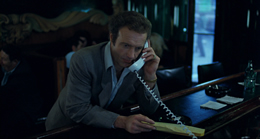
The Criterion release also adds a trio of new extras, kicking off with Michael Mann and film critic Scott Fondas having a 24-minute discussion about the filmmaker's attraction to crime films and the urban mythology with which he grew up, the experiences leading up to this film, and the reliance on real props and techniques to draw out more realistic performances from the actors. Interestingly, he also explains how he originally intended to use blues music in the film but wound up going electronic instead, a decision about which he still seems unsure. Next comes a 10-minute discussion with Caan (looking almost unrecognizable with a thick beard) who talks about his pride in the film (which he regards as one of his best), the incredibly long shooting hours, and the involvement of late real-life thief John Santucci, who served as a consultant and appears in the film. (Santucci went on to work on future Mann projects before returning to a life of crime, incredibly enough.) Finally, former Tangerine Dream member Johannes Schmoelling contributes a 15-minute chat in German with English subtitles about working with Mann, the group's genesis, the influence of Pink Floyd's "Comfortably Numb" on one pivotal track, and zip about their outstanding and sorely underrated follow up film with Mann, The Keep, which is still screaming out for a special edition. The theatrical trailer is also included along with a liner notes booklet including a dense essay by Nick James ("Where Nothing Means Nothing"), who explores the film's transition status between decades and the director's visual and thematic concerns already found here fully formed. A highly satisfying release of a film that still feels absolutely modern and cutting edge right to the core.
Reviewed on January 1, 2014.
![]()